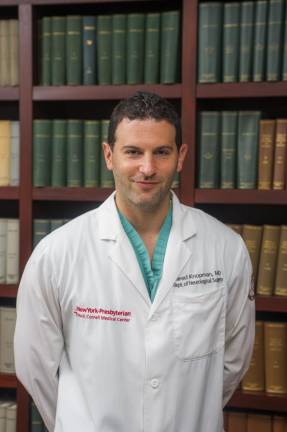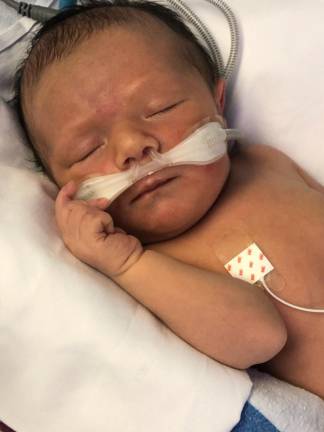A Baby Beats the Odds
Dr. Jared Knopman, neurosurgeon at NewYork-Presbyterian/Weill Cornell, on treating a newborn with a rare condition.
In July of 2020, Miles Rizzo was born with a vein of Galen malformation, a congenital abnormality of the blood vessels in the brain, which affects only one and three million babies. A patient at NewYork-Presbyterian/Weill Cornell Medical Center, Miles was fortunate enough to have Dr. Jared Knopman brought onto his treatment plan when he was just two months old.
A graduate of the Mount Sinai School of Medicine, Knopman specializes in diseases of the blood vessels of the brain and spine, such as brain aneurysms, strokes and brain bleeds. Since most vascular conditions occur in adults, pediatric patients make up only 10 percent of his practice.
Knopman, who ultimately performed five surgeries on Miles, made sure to stress that his successful care was a team effort brought about with the help of dedicated doctors across the medical spectrum, nurses and staff at NewYork-Presbyterian, as well as Miles’ parents, AC and Amy Rizzo. He credits the pair for not only educating themselves on their son’s condition, but maintaining a sense of calm while he spent 182 days in the neonatal intensive care unit (NICU).
The feeling is mutual. When asked about how Knopman kept them comforted during that difficult time, Rizzo said, “He was very personable and always optimistic despite Miles’ condition. He gave us hope because we knew Miles’ was in the best care with him.”
Just last month, Miles, who the hospital calls its “miracle baby,” celebrated his first birthday. “He is babbling, forming his own opinions, learning to crawl, standing with assistance, smiling, eating up a storm – doing all the things one-year-old babies are typically doing,” Rizzo said.
When did you start at NewYork-Presbyterian and why did you choose that hospital?
I began my career as an attending physician in 2012 and chose that hospital because I had trained there. I did my residency and my fellowship at NewYork-Presbyterian Weill Cornell. And I found it to be the strongest program in the New York area for this field. I think it’s one of the most innovative institutions. A lot of new techniques, which are now adopted as standard of care, have been born out of that department, and I wanted to be a part of it and a leader in it.
Explain what your patient, Miles Rizzo’s, condition was.
During the third trimester, a baby develops a very large vein in the brain that essentially hijacks all the blood flow. And what happens is this high-pressure vascular abnormality can have systemic effects on the entire body. It can cause things like heart failure, lung dysfunction, kidney failure and obviously neurologic consequences. Oftentimes, if it goes untreated, they’re almost uniformly fatal. And they’re probably one of the rarest, with one in three million patients to be born with it, and most challenging pathologies to treat.
The issue is these kids unfortunately really can’t breathe well on their own. Their heart begins to fail them. Sometimes they’re able to push treatment off until the babies are a little bit larger and can withstand certain forms of medical treatment. Unfortunately, in Miles’ case, he was very unstable from a very young age and we had to intervene really by the time he was two months old because he was progressively developing worsening heart failure.
What kind of treatment plan did Miles undergo?
The goal of the vein of Galen malformation treatment is basically to sequentially shut down the blood vessels that are feeding it without causing it to rupture, causing the baby to have a stroke. So these malformations are a very, very large vein with innumerable arteries that feed into it. And essentially, what we have to do is take it apart piece by piece – almost like diffusing a bomb, so to speak – because you have to take care of the inflow without affecting the outflow or else it will rupture. And if you do it all at once in one treatment, their brains can’t handle the rapid change in flow, so you have to give them a chance to accommodate each treatment but also do it in a timely fashion so that you’re helping their heart and their lungs get out of that danger zone that they’re in by having a vein of Galen situation.
So in Miles’ case, he ended up having five endovascular treatments; that’s the minimally invasive treatment where we go in through a needlestick in the artery in the leg. We put catheters up into the brain and close down the arterial feeders with a combination of devices like platinum coils, glue, all these things available to interrupt the blood flow.
In a typical week, you conduct 12 to 15 surgeries. How do you mentally prepare for them?
I think for all surgeries, for me personally, I play in my mind how I anticipate the day to go. And I think about a certain treacherous point and a potential complication that can occur, and what I’m going to do if that occurs. So you’re sort of mentally envisioning your day before you’re doing it and trying to foresee any problems. Now, the thing about medicine, especially when you’re dealing with children, you know how fragile and little room for error there is because you’re dealing with someone that has less capacity for certain types of injury and they give you less feedback because you’re dealing with someone that can’t tell you where something hurts or where something is going wrong. So you definitely run into things that you can’t predict, but mentally, for me personally, I just view it as a list of sort of a hundred moves that I’m going to do that day and what could happen.
As for Miles’ parents, how did you comfort them during that time?
Well Miles’ parents were really pretty remarkable in this. I have daughters, and I can’t imagine how I would be if one of mine at that young of an age, being so vulnerable, was diagnosed with a condition that was so rare and so high risk. So Miles’ parents were incredible in this process in a couple of ways. One is they were, despite obviously being appropriately nervous and scared, very calm and asked great questions. And they learned as much as they could, so they were educated. They were integral in the management of Miles because at the end of the day, they’re your most important teammate. You’re actively having conversations every day, multiple times a day, throughout this multi-month treatment. He’s undergoing five procedures and you’re obviously speaking throughout the process. So having a parent or parents who are in the entire process and maintaining their own emotions so that they can also learn what they have to get through in a very treacherous time is rare to see obviously, because we’re all overtaken by our emotions sometimes. But in Miles’ case, I remember, very vividly, how good of a partner his parents were in this process.
What can you tell about Miles’ success?
One of the things that really comes to light in his care is how much he beat the odds of the typical outcome of something like this. And a huge portion of that was due to the fact that he was at an institution that has expertise on all levels. This can’t get done just by a neurosurgeon or cardiologist or neonatal intensivist somewhere. This only works if you’re at a place where everyone is rolling with the same effort and level of expertise. I think there are very few institutions that can pull off what Miles had done beside Cornell.
“Essentially, what we have to do is take it apart piece by piece – almost like diffusing a bomb, so to speak – because you have to take care of the inflow without affecting the outflow or else it will rupture,” Dr. Jared Knopman


